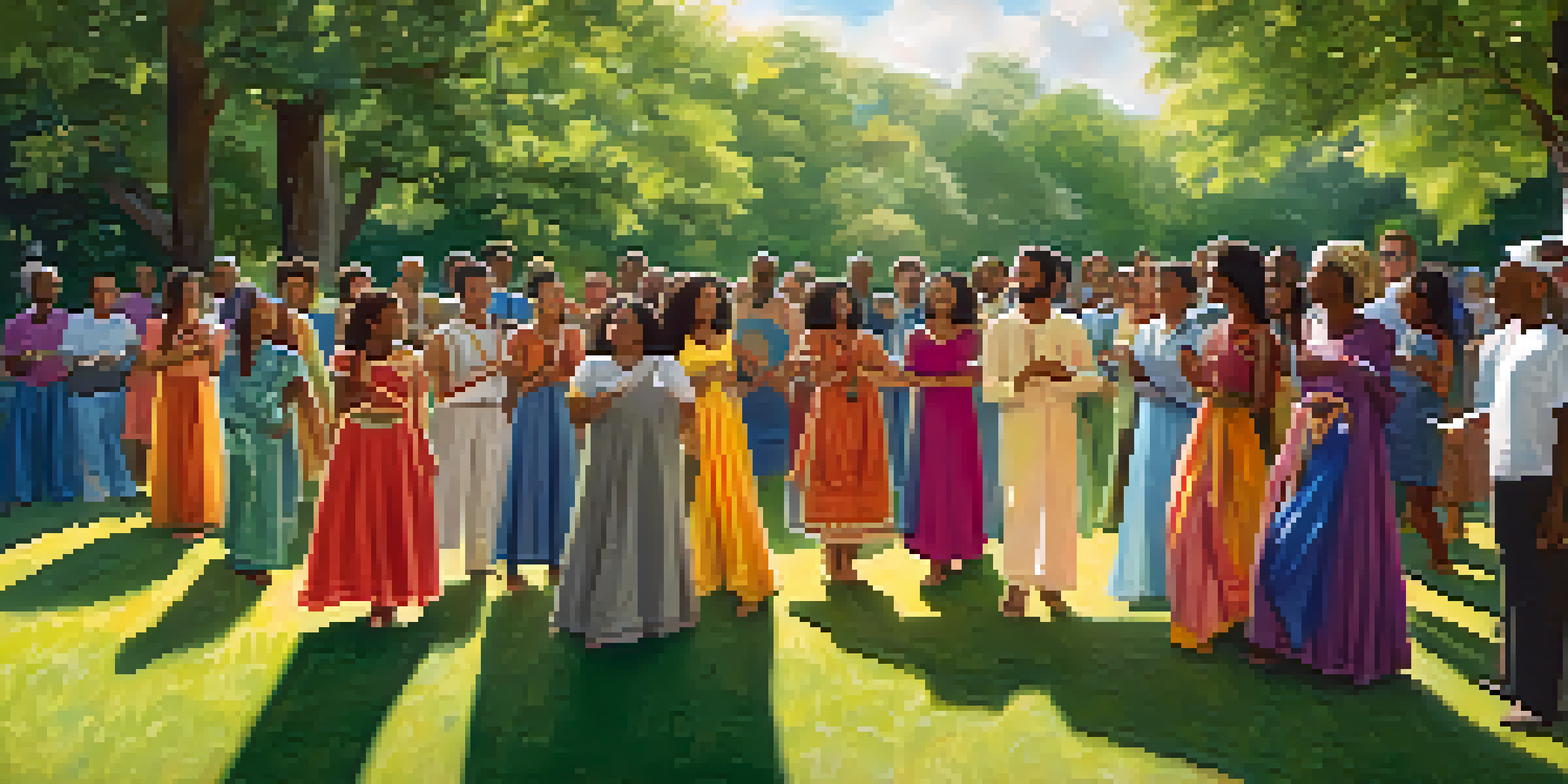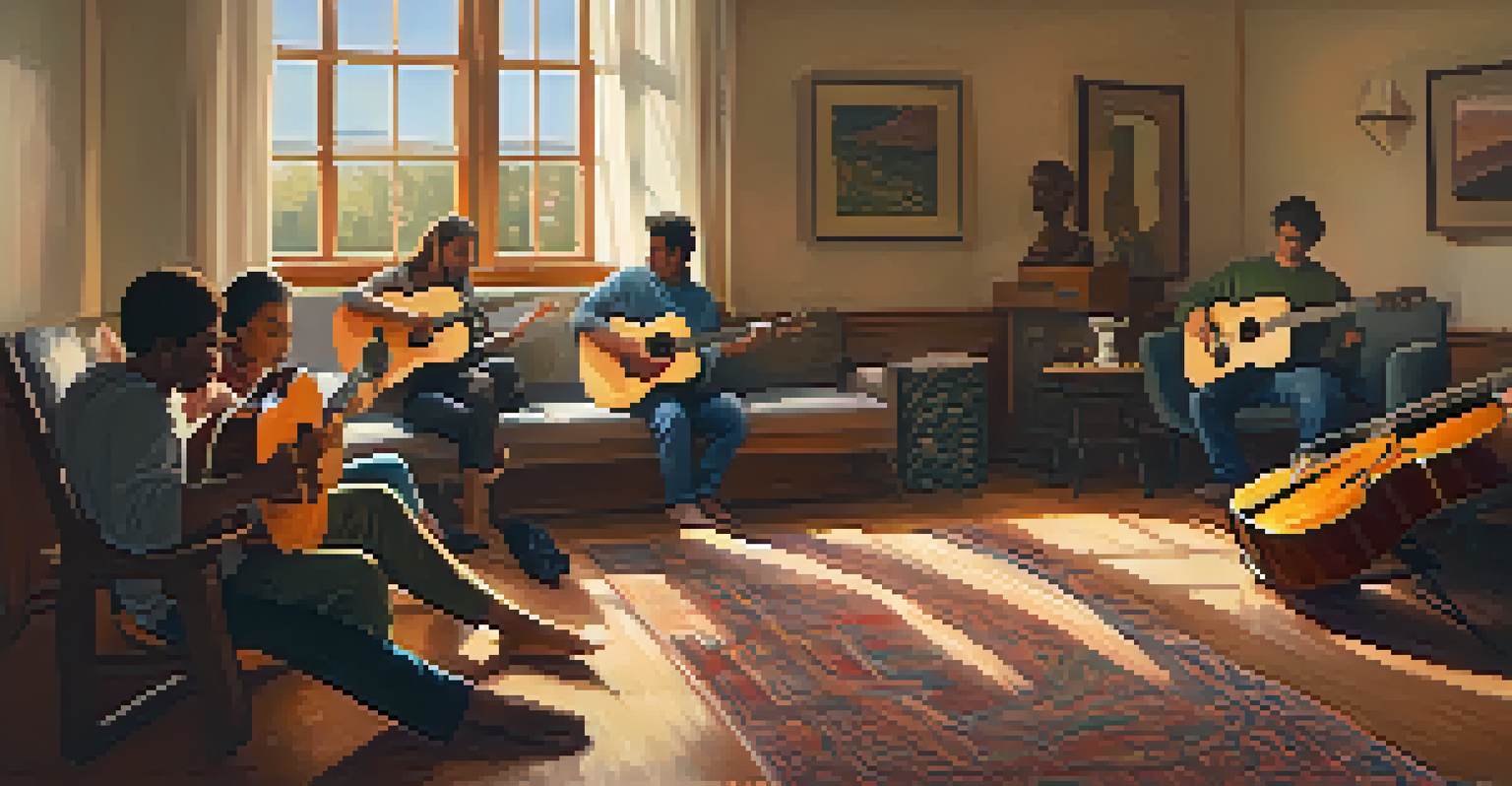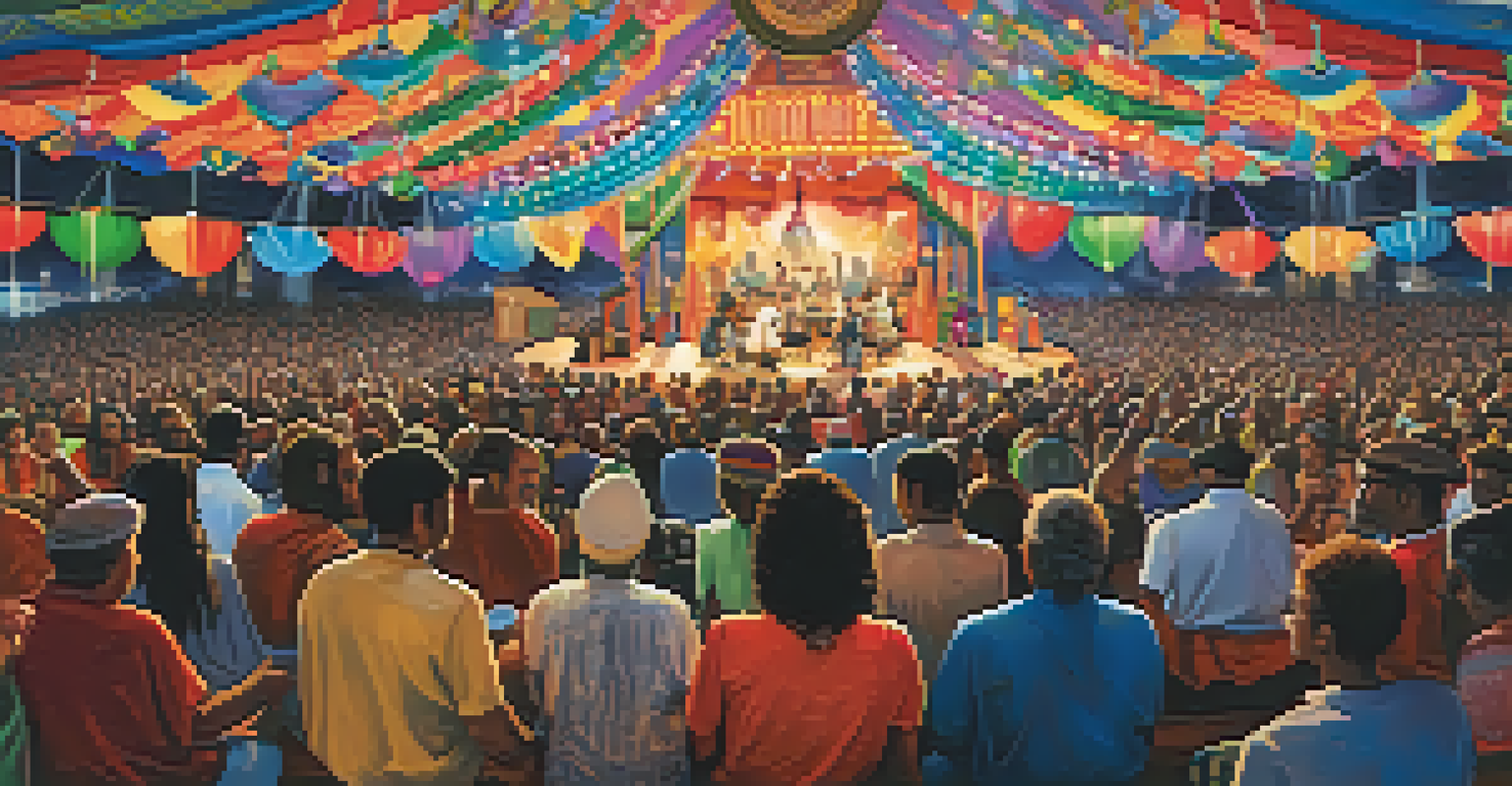The Role of Music in Religious and Spiritual Community Practices

The Historical Significance of Music in Religious Practices
Music has been intertwined with religious practices for centuries, serving as a universal language that transcends cultural boundaries. Ancient civilizations, from the Greeks to the Egyptians, used music in rituals to honor deities and foster community spirit. This long-standing tradition highlights the importance of music not just as entertainment, but as a vital component of spiritual expression.
Music can change the world because it can change people.
In many cultures, sacred music is believed to facilitate a connection with the divine. For example, Gregorian chants in Christianity are designed to elevate the soul, while Sufi whirling dervishes incorporate music into their spiritual trance. Such practices underscore how music has historically played a role in enhancing worship and communal experience.
Today, many religious communities still maintain this tradition, using music to create a sense of belonging. Whether it's hymns sung in church or chants recited in temples, these musical expressions foster unity among members, reinforcing shared beliefs and values.
The Emotional Connection Between Music and Spirituality
Music has a unique ability to evoke deep emotions, making it a powerful tool in spiritual practices. The melodies and rhythms can stir feelings of joy, peace, and even sorrow, allowing individuals to connect with their inner selves and the divine. This emotional resonance can enhance the overall spiritual experience during religious gatherings.

For instance, consider how a moving hymn can uplift a congregation, or how a soulful instrumental piece can create a moment of reflection during a meditation session. These emotional responses are not just personal; they often resonate collectively, fostering a communal atmosphere that deepens the spiritual experience.
Music Enhances Spiritual Connection
Music serves as a universal language that deepens the emotional and spiritual experience in religious practices.
Moreover, music can serve as a form of emotional release, helping individuals process their feelings and connect with their spirituality on a deeper level. Whether it’s through joyful celebration or solemn remembrance, music allows for a range of emotional expressions that enrich the spiritual journey.
The Role of Music in Rituals and Ceremonies
Rituals and ceremonies are often the backbone of religious practices, and music plays a crucial role in these occasions. From weddings to rites of passage, music helps mark significant life events, adding layers of meaning and emotion to the rituals. The sounds and songs chosen often reflect the beliefs and values of the community.
Where words fail, music speaks.
Take, for example, the use of traditional songs during a wedding ceremony. These songs are not just background music; they are integral to the ceremony, evoking cultural heritage and shared history. Similarly, in many indigenous communities, music is woven into healing rituals, where specific songs are believed to harness spiritual power.
By incorporating music into rituals, communities create a more immersive experience that resonates with participants on multiple levels. This enhances the significance of the event, making it a memorable occasion that strengthens communal bonds.
Community Building Through Collective Music Making
Music has a unique capacity to bring people together, serving as a powerful tool for community building in spiritual contexts. Singing together or participating in group drumming can create a sense of unity and shared purpose among participants. This collective experience fosters deeper relationships and strengthens community ties.
For instance, many spiritual gatherings include communal singing, where participants join in to create a harmonious atmosphere. This act of singing together can break down barriers, allowing individuals from diverse backgrounds to connect through shared musical expression. Such experiences can be transformative, leaving participants with a sense of belonging.
Community Unity Through Music
Collective music-making fosters a sense of belonging and strengthens relationships within spiritual communities.
Additionally, community music-making often extends beyond traditional worship settings. Many faith-based organizations host music workshops or concerts, encouraging participation and collaboration. These events not only uplift spirits but also reinforce the idea that everyone has a role to play in the community.
The Therapeutic Benefits of Music in Spiritual Contexts
The therapeutic effects of music have been well-documented, and these benefits extend into spiritual practices as well. Many individuals find solace in music during times of grief or distress, using it as a means of coping and healing. In spiritual contexts, music can serve as a balm for the soul, promoting emotional and psychological well-being.
For example, many religious groups incorporate music therapy into their support programs, allowing individuals to express their feelings through song. This can be particularly powerful in environments where talking about emotions might be challenging. By engaging with music, individuals can find new ways to confront their struggles and seek comfort.
Moreover, spiritual music often features calming melodies and positive messages that can foster resilience and hope. Whether it's through listening to uplifting tracks or participating in group singing, the therapeutic benefits of music can enhance overall spiritual well-being and support personal growth.
The Evolution of Music in Modern Spiritual Practices
As society evolves, so does the role of music in spiritual practices. Contemporary religious communities often blend traditional musical forms with modern genres, creating a unique sound that resonates with younger generations. This evolution reflects the changing cultural landscape and the need for relevance in spiritual expression.
For instance, many churches now incorporate contemporary Christian music, using popular genres to attract younger audiences and engage them in worship. Similarly, spiritual gatherings may feature world music influences, reflecting the diverse backgrounds of their members. This fusion of styles not only honors tradition but also embraces innovation.
Music Bridges Faiths and Cultures
Interfaith musical events promote understanding and appreciation among diverse religious groups, highlighting common values.
This modern approach to music in spiritual contexts allows communities to stay connected with their members while broadening their reach. By adapting musical practices to fit contemporary tastes, spiritual communities can keep their messages alive and relevant, ensuring that music remains a vital part of their identity.
Music as a Catalyst for Interfaith Dialogue and Understanding
Music can serve as a bridge between different faith communities, fostering interfaith dialogue and understanding. By sharing musical traditions, diverse groups can find common ground, breaking down barriers and promoting respect for one another's beliefs. This shared experience can lead to deeper conversations about spirituality and values.
For example, interfaith concerts or music festivals often bring together artists from various backgrounds, showcasing the beauty of their unique traditions. These events not only celebrate diversity but also encourage collaboration and mutual appreciation. Through music, participants can experience the rich tapestry of spiritual beliefs in a way that feels welcoming and inclusive.

In this way, music acts as a unifying force, demonstrating that while beliefs may differ, the emotional and spiritual power of music is universally relatable. This shared appreciation can lay the groundwork for ongoing dialogue and cooperation among different faith communities.